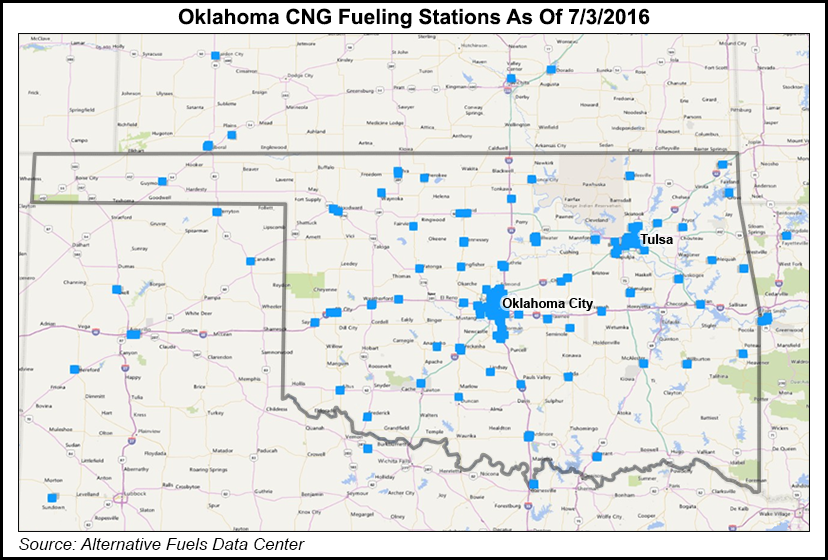Infrastructure | NGI All News Access
Oklahoma Reaches NGV Fueling Milestone
At the center of a five-year, multi-state push for more natural gas vehicle (NGV) use, Oklahoma has passed a milestone in putting together a network of fueling stations along its interstate highways, drawing praise Tuesday from Washington, DC-based trade group NGVAmerica.

The oil/natural gas-rich Sooner State now has at least one compressed natural gas (CNG) fueling station every 100 miles of interstate highways. “Oklahoma’s robust NGV fueling network continues to support the state’s growing number of motorists looking to take advantage of natural gas as a motor fuel,” said Matt Godlewski, NGVAmerica president.
In 2011, Gov. Mary Fallin established a push in the state to develop more use of natural gas in transportation (see Daily GPI, Nov. 10, 2011). Fallin established a state energy plan stressing the importance of natural gas as a motor fuel.
The initial goal was to establish at least one CNG station every 100 miles of interstates by the end of 2015. Godlewski said the mission has been accomplished, and Oklahoma has provided “an impressive example for other states looking to transition to natural gas.”
Fallin and a number of CNG retail providers — OnCue Express, Love’s Travel Stops, Sparq Natural Gas, Oklahoma Natural Gas and Tulsa Gas Technologies — gathered recently to mark the milestone at an OnCue Express CNG station in Billings, OK.
In 2011, Fallin joined the governors of Colorado, Pennsylvania and Wyoming in signing a pact designed to increase the use of NGVs in the fleets of each state. A memorandum of understanding called for the states to aggregate fleet vehicle procurements with the intent of creating a demand base sufficient to support the design, manufacture and sale of NGVs by U.S. manufacturers.
Eventually, more than 100 bids from dealers in 28 states were received as part of a 22-state effort to get bids from the auto industry to supply NGVs for government fleets in each of the states (see Daily GPI, Oct. 8, 2012).
Godlewski called Oklahoma the nation’s leader in NGVs and fueling infrastructure on a per-capita basis. “The state has saved more than $1 million in fuel costs after converting most of its fleet to CNG,” he said.
© 2024 Natural Gas Intelligence. All rights reserved.
ISSN © 1532-1231 | ISSN © 2577-9877 |
